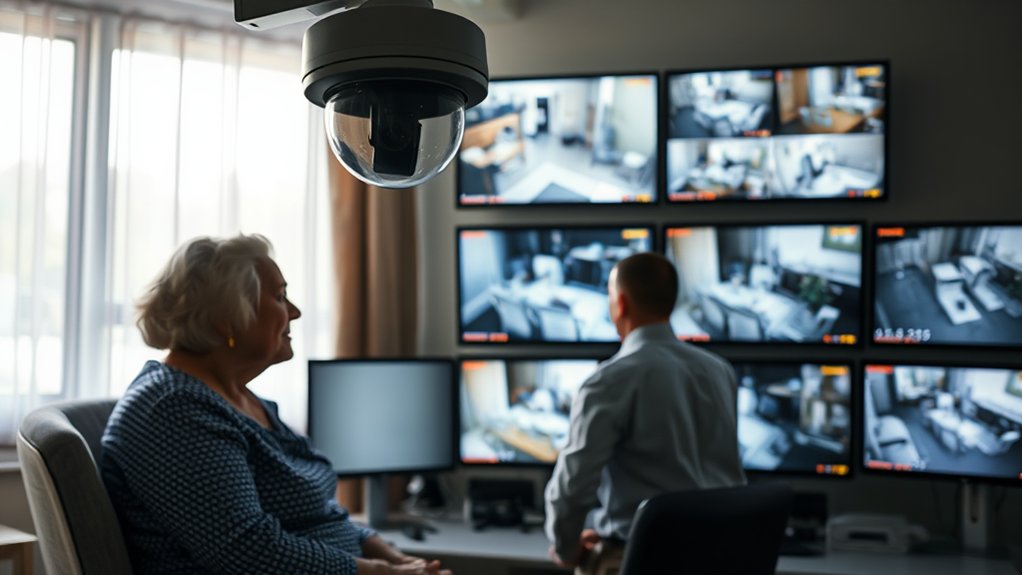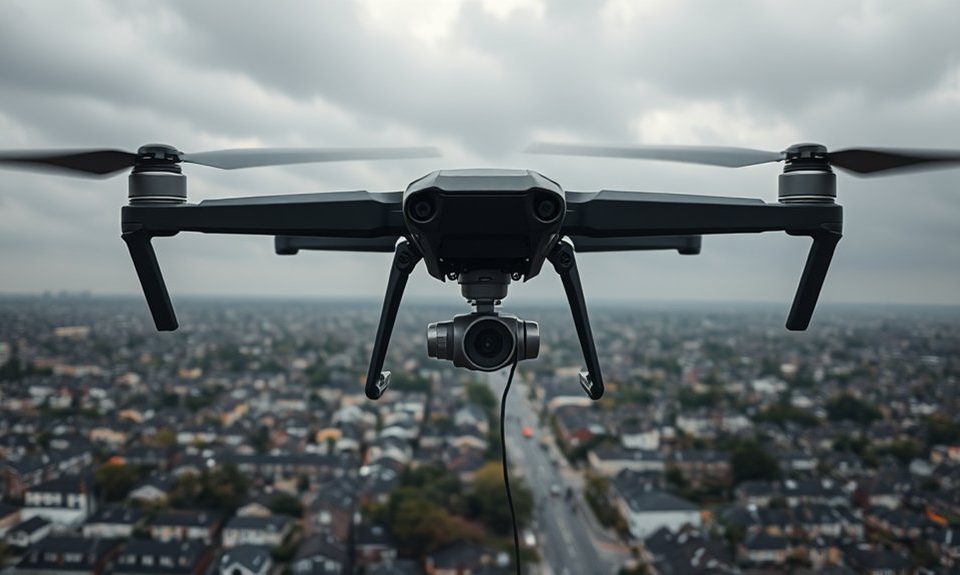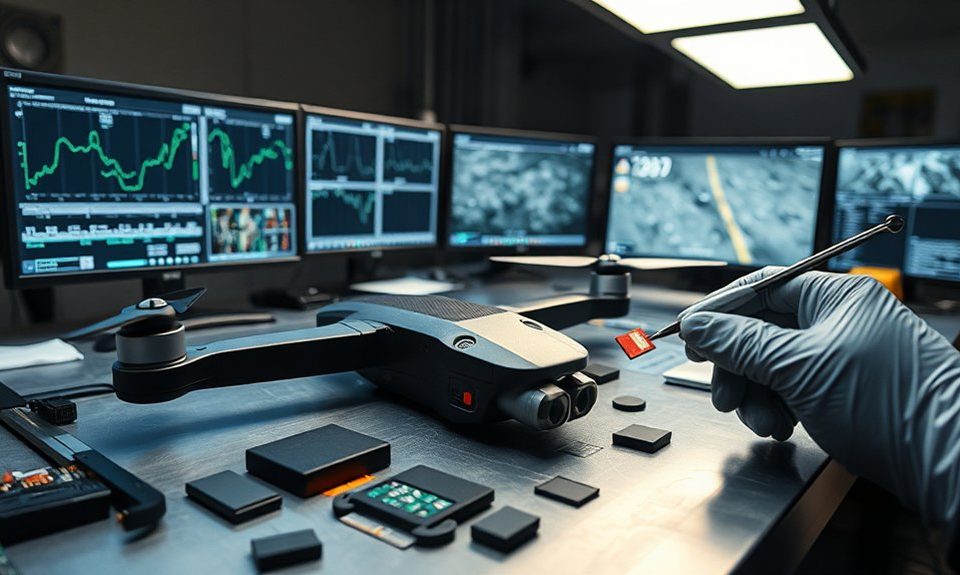Private investigators protect senior care residents through multiple specialized approaches. They conduct thorough surveillance using strategically placed cameras and monitoring systems in common areas. Thorough background screening of facility staff helps prevent potential abuse. Investigators systematically review records, conduct interviews, and analyze footage to identify signs of exploitation or neglect. They collaborate with law enforcement and elder advocates while maintaining strict privacy protocols. Understanding these protective measures reveals the extensive safeguards available for vulnerable seniors.
Key Takeaways
- Investigators employ comprehensive surveillance systems in common areas to monitor and document potential signs of abuse or neglect.
- Background screening and thorough staff evaluations help prevent hiring individuals with concerning histories in senior care facilities.
- Regular review of facility records, staff interviews, and resident interactions identifies patterns indicating potential mistreatment or exploitation.
- Collaboration with multiple agencies creates stronger protection through shared resources, information exchange, and coordinated response protocols.
- Strict adherence to legal and privacy regulations ensures proper evidence collection while protecting residents’ rights and confidentiality.
Surveillance Techniques in Senior Care Facilities

Professional surveillance in senior care facilities requires specialized methods that balance investigative needs with resident privacy and dignity. Private investigators employ discrete active monitoring systems, including strategically placed cameras in common areas and corridors, while strictly avoiding private spaces like bathrooms and bedrooms.
Behavioral observation techniques focus on staff-resident interactions, monitoring for signs of neglect or abuse. Investigators document daily routines, meal delivery, medication administration, and social activities. They analyze staff patterns, visitor logs, and facility access points while maintaining resident confidentiality.
These surveillance methods often incorporate both technical tools and human observation, allowing investigators to build thorough evidence while respecting senior care regulations. Investigators coordinate with facility management to guarantee their presence remains unobtrusive and does not disturb the residents’ quality of life. Evidence gathering techniques require meticulous documentation and preservation to ensure findings can support potential legal action.
Background Screening of Care Staff and Personnel
Background screening represents an essential component of private investigative work in senior care facilities, where thorough vetting of potential employees helps safeguard vulnerable residents. Private investigators conduct extensive evaluations that extend beyond standard employment checks, examining candidates’ complete professional and personal histories.
The screening process includes detailed resume verification to confirm educational credentials, employment history, and professional certifications. Investigators perform extensive reference checks, contacting former employers and associates to assess the candidate’s reliability and character. They also review criminal records across multiple jurisdictions, verify professional licenses, and examine civil court records for potential red flags.
These thorough background investigations help facility administrators make informed hiring decisions, ensuring their staff consists of qualified individuals who can be trusted with resident care. Professional investigators utilize specialized tools and techniques to gather authoritative evidence that can be used in legal proceedings if necessary.
Elder Abuse Investigation Methods
While thorough staff screening helps prevent potential abuse, private investigators employ specific methodologies when investigating suspected elder abuse cases in senior care facilities. They conduct systematic reviews of facility records, interview staff and residents, and analyze surveillance footage to identify elder exploitation indicators. Investigators document physical signs of abuse, unexplained financial transactions, and changes in resident behavior patterns.
Investigators also evaluate caregiver training strategies and adherence to established protocols. They examine staff schedules, resident care logs, and medication administration records to detect irregularities. Through discrete observation periods, they assess staff-resident interactions and facility conditions. When necessary, they coordinate with medical professionals to obtain expert opinions on injuries or health deterioration. This methodical approach helps build thorough cases that protect vulnerable seniors and support legal proceedings when abuse is confirmed. Traditional surveillance options are often limited, making modern investigative technology essential for detecting and preventing abuse in senior care settings.
Digital Monitoring and Documentation Systems
Modern digital monitoring systems have revolutionized how private investigators document and track activities within senior care facilities. These systems integrate multiple surveillance technologies, allowing investigators to maintain thorough records of staff-resident interactions and facility operations.
Remote monitoring capabilities enable investigators to observe real-time footage from multiple locations while ensuring data security through encrypted connections. Digital documentation platforms store time-stamped videos, photos, and incident reports in secure cloud databases, creating irrefutable evidence when needed. These systems also feature automated alerts for unusual activities or unauthorized access attempts.
Investigators can efficiently analyze patterns, cross-reference incidents, and generate detailed reports using integrated software solutions. This technological advancement has greatly improved the accuracy and reliability of elder care investigations while reducing the risk of evidence tampering or loss. Similar to their cohabitation surveillance expertise, investigators employ advanced technology to gather admissible evidence that stands up in court proceedings.
Collaboration With Law Enforcement and Elder Advocates
Private investigators working in senior care cases regularly establish formal partnerships with local law enforcement agencies and elder advocacy organizations to enhance investigative outcomes. These collaborative relationships facilitate the secure sharing of critical intelligence, investigative techniques, and specialized resources related to elder abuse and exploitation cases. Pooling resources and expertise across agencies helps create more thorough investigations while avoiding duplicative efforts and ensuring vulnerable seniors receive coordinated support services. Their expertise in hidden camera surveillance provides crucial evidence when investigating potential abuse or neglect in senior care facilities.
Building Strong Agency Partnerships
Establishing strong partnerships between investigative agencies, law enforcement departments, and elder advocacy organizations creates a robust support network for protecting senior care residents. Through strategic alliances, private investigators can leverage shared resources, expertise, and information channels to enhance their effectiveness in safeguarding seniors.
Agency collaboration enables seamless coordination during investigations, allowing for quick response times and thorough case management. Private investigators work closely with local police departments to share critical findings, while elder advocacy groups provide valuable insights into resident needs and vulnerabilities. These partnerships also facilitate ongoing training opportunities, helping investigators stay current with emerging threats and best practices in senior protection. Regular inter-agency meetings and established communication protocols ensure that all stakeholders remain aligned in their mission to protect elderly residents.
Sharing Intelligence and Resources
Effective intelligence sharing between private investigators, law enforcement agencies, and elder advocacy groups forms the foundation of successful senior care investigations. This collaborative approach optimizes resource allocation while creating an all-encompassing safety net for vulnerable seniors.
Key components of intelligence sharing include:
- Regular case briefings where investigators share findings with local law enforcement, focusing on emerging threats and suspicious patterns within senior care facilities
- Secure digital platforms that allow real-time information exchange between authorized investigators and elder abuse response teams
- Coordinated database access that enables cross-referencing of incident reports, background checks, and documented complaints across multiple agencies
This systematic approach to information sharing strengthens investigative outcomes while ensuring efficient use of available resources, ultimately providing better protection for senior care residents.
Legal Rights and Privacy Considerations
When conducting investigations in senior care facilities, three fundamental legal considerations must be balanced: residents’ constitutional privacy rights, facility security protocols, and investigator licensing requirements.
| Legal Requirements | Privacy Implications |
|---|---|
| State PI licensing | Resident consent forms |
| HIPAA compliance | Medical record access |
| Elder abuse reporting | Camera surveillance zones |
| Facility contracts | Visitor documentation |
Investigators must strictly adhere to legal obligations while respecting established privacy policies. This includes obtaining proper authorization before accessing resident areas, maintaining confidentiality of medical information, and following facility-specific documentation requirements. Private investigators cannot violate resident privacy rights even when gathering evidence of suspected abuse or neglect. They must work within defined legal parameters while coordinating with facility administrators to guarantee all investigative activities remain compliant with state and federal regulations. Civil litigation cases often require extensive documentation and evidence gathering to support legal proceedings involving senior care facilities.
Frequently Asked Questions
How Much Do Private Investigators Charge for Senior Care Surveillance Services?
Private investigators typically charge $50-150 per hour for senior care surveillance, with cost factors including duration, equipment needs, and service packages. Monthly retainer options range from $1,000-3,000 for thorough monitoring.
Can Family Members Hire PIS Without the Facility’s Knowledge?
While legally permissible, hiring investigators without facility knowledge raises ethical considerations and privacy concerns. Transparency with facilities often leads to better cooperation and more effective resident monitoring outcomes.
What Credentials Should Private Investigators Have for Senior Care Investigations?
Professional investigators should possess state-required licensing, undergo thorough background checks, maintain liability insurance, demonstrate experience with elder care cases, and understand healthcare regulations and patient privacy laws.
How Long Does a Typical Senior Care Facility Investigation Take?
Investigation timelines for senior facilities typically range from two weeks to three months, depending on facility factors like size, staff schedules, number of residents, and complexity of reported issues.
Do Private Investigators Provide Witness Testimony in Elder Abuse Court Cases?
Private investigators regularly testify in elder abuse cases, providing professional documentation and evidence that strengthens witness credibility. Their expert testimony often markedly influences case outcomes in legal proceedings.
Conclusion
Private investigators play a essential role in protecting senior care residents through extensive surveillance, thorough background checks, and systematic abuse investigations. By utilizing advanced digital monitoring systems and maintaining strong partnerships with law enforcement and elder advocacy groups, PIs help guarantee resident safety while respecting legal privacy rights. Their professional oversight serves as a significant safeguard for vulnerable seniors in residential care facilities.





